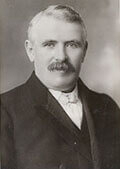the Last Week after Epiphany
Click here to join the effort!
Bible Commentaries
Jones' Commentary on the Book of Mark Jones on Mark
New Testament
Author's Biography
John Daniel Jones (1865-1942) was a prominent Welsh Congregationalist minister known for his eloquent preaching, pastoral sensitivity, and significant contributions to religious literature in the early 20th century. Born in Ruthin, Denbighshire, Jones grew up in a devout Christian household, which laid the foundation for his lifelong commitment to the church and its teachings.
Jones' academic journey began at the University College of North Wales, Bangor, where he excelled in his studies, showing early signs of his intellectual prowess and deep interest in theology. He furthered his education at Mansfield College, Oxford, immersing himself in the study of theology and preparing for his future role in the ministry. Jones' time at Oxford was transformative, equipping him with the theological depth and critical thinking skills that would hallmark his later work.
Following his graduation, Jones accepted a position as pastor at Richmond Hill Congregational Church in Bournemouth, where he served from 1898 to 1942. His tenure at Richmond Hill was marked by a significant growth in the congregation, largely due to his powerful oratory skills and his ability to connect deeply with his parishioners on both spiritual and personal levels. Jones' sermons, characterized by their clarity, depth, and relevance, drew large audiences and solidified his reputation as a leading preacher of his time.
Jones was also a prolific writer, contributing numerous articles and books on religious subjects, including devotional works, theological treatises, and commentaries on biblical texts. His writings, appreciated for their insightful analysis and practical application, further extended his influence beyond his immediate congregation to a wider audience of readers seeking spiritual guidance and enrichment.
Throughout his career, John Daniel Jones remained committed to the principles of Congregationalism, advocating for the autonomy of the local church and the importance of a personal, heartfelt faith. His legacy endures through his written works and the lasting impact of his ministry, remembered as a beacon of light in the religious life of Wales and beyond.
